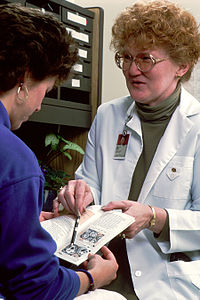
Photo from wikipedia
Purpose To investigate the relationship among patients’ stereotypes of doctors, effectiveness of doctors’ communication skills evaluated by patients, and patients’ trust in doctors. Patients and Methods A cross-sectional survey with… Click to show full abstract
Purpose To investigate the relationship among patients’ stereotypes of doctors, effectiveness of doctors’ communication skills evaluated by patients, and patients’ trust in doctors. Patients and Methods A cross-sectional survey with a total of 3289 patients from 103 hospitals in eastern, central and western China was conducted. Results There were strong correlations among patients’ stereotypes, patients’ evaluation on doctors’ communication skills, and patients’ trust (r = 0.50–0.67, p < 0.01 for all). Patients’ trust was predicted by patients’ stereotypes directly (β = 0.32, 95% CI: 0.27–0.37) and indirectly (β = 0.19, 95% CI: 0.16–0.23) through patients’ evaluation on doctors’ communication skills. Conclusion Both patients’ stereotypes and patients’ evaluation on doctors’ communication skills have predictive effects on patients’ trust. Patients’ stereotypes are not only a direct predictor of patients’ trust but also an indirect predictor via doctors’ communication skills as a mediator. This national survey underlines the significance of patients’ stereotypes, and emphasizes the importance of developing doctors’ communication skills on patients’ trust. In order to build a more trustful doctor–patient relationship, there should be a joint effort at social and individual level to reinforce positive impression and suppress negative stereotypes of doctors. As far as communication skills are concerned, doctors are encouraged to use helpful verbal and nonverbal techniques that benefit their profession impression management.
Journal Title: Psychology Research and Behavior Management
Year Published: 2022
Link to full text (if available)
Share on Social Media: Sign Up to like & get
recommendations!